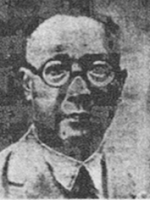 |
| Toh Khay Beng 杜啟明, JP |
One of the oldest and renowned general stores in Taiping, was the Taik Ho & Co. (得和公司), stationed at No 82, Main Road. Its head company was at Taiping, with a branch office at No 93, Belfield Street, Ipoh. The firm was commenced by Toh Khay Beng in 1889.
Born in 1859, Toh Khay Beng was among the early batch of Chinese immigrants settled in Taiping during 1870s. Being a son of Tong'an, Fujian, he came from China and commenced his early business in Penang in 1883. And for nine years he had been actively engaged in tin mining in Perak and managed to establish himself into various businesses. For twelve years Toh Khay Beng had been a member of the Taiping Sanitary Board and was one of the local Visiting Justices.
Taik Ho & Co. was a well-known provision shop selling liquors, opium, various imported food stuffs and was a licensed arms dealer. His firm also arranged sedan chairs and coolies to transport the Europeans to the Larut Hills. Toh Khay Beng died in July 1923 after battling with a long illness since 1916 and his firm was left to his sons Toh Eng Swee and Toh Eng Hoe. In order to honour the early pioneer of Taiping, the Sanitary Board decided to name a road after him. In 1910, his son Toh Eng Hoe founded the Guan Ho Distillery (源和酒廠), which located next to Taik Ho & Co. Today the management of Taik Ho & Co. has been incorporated with its subsidiary the Guan Ho & Co. Ltd. (得和源和有限公司), which was established by Toh Eng Hoe. Under its new name, Taik Ho & Guan Ho Ltd, the managing directors are Toh Theam Chuan 杜添全 and Toh Teck Au.
Toh Kay Beng was also known as a generous philanthropist to several Chinese temples and associations, as well as endowed financial support to educational institutions in Taiping. In order to honour this early pioneer, the Taiping Sanitary Board named a road after him in the town.
Toh Kay Beng was also known as a generous philanthropist to several Chinese temples and associations, as well as endowed financial support to educational institutions in Taiping. In order to honour this early pioneer, the Taiping Sanitary Board named a road after him in the town.
Born in Taiping, Toh Eng Hoe was educated at King Edward VII School, Taiping, where he was awarded Sir William Taylor’s prize for the best essay and a silver medal as the head boy of the school in 1915. He was matriculated at Penang and went to Hong Kong University on 1916. But in a year later, he had to discontinue further studies on account of his father’s illness. With a Master of Surgery (MCh), Toh Eng Hoe was a registered doctor and served the Taiping General Hospital for some years.
On the death of his father, Toh Khay Beng in 1923. Toh Eng Hoe became the sole proprietor of Taik Ho & Co, well-known provision shop, Chop Guan Ho and the Taiping Spirit Distillery. He was also a well-known planter and a racehorse owner and had established a motor-garage in Barrack Road (Taiping) in 1926.
Being a busy man, Toh Eng Hoe had always taken an active part in public matters and was the president of the Chinese Sporting Club (Taiping), Chin Woo Athletic Association (Taiping) and the Chinese Benevolent Society. He was also a senior unofficial member of the Sanitary Board of Larut & Matang, member of the Rubber Licensing Board, Small Holdings (Restriction of Sale) Committee, Public Gardens Committee, Visiting Justice to the Taiping Jail, Visitor to the Larut District and General Hospitals and the Decrepit Settlement. He was also a member of the Perak State Council (1948 – 1955).
Toh Eng Hoe also associated himself with all social activities and his name was a valuable asset to the Hokkien Association where he was the president and also the Taiping Literary Improvement Association, Chinese Advisory Board of Perak, the Cheng Luan Seah (Penang) and a trustee of the Toh Kongsi (Penang) and a director of Taiping Cinema Ltd.
Toh Eng Hoe was appointed Justice of the Peace in 1933 by the Sultan of Perak and made an Honorary Commander of the Order of the British Empire in 1956. The contributions and services of Toh Eng Hoe to the people and government of Perak were credited as invaluable. He was decorated with Darjah Datuk Paduka Mahkota Perak (DPMP) which carries the title Dato. In his later life, Toh Eng Hoe was made a Member of the Order of the Defender of the Realm (AMN) for his meritorious service to the country. And was conferred with a Pingat Jasa Kebaktian (PJK) by the Sultan of Perak.
Toh Eng Hoe's Children:
- Toh Theam Hock: Second son. A lawyer, called to the Malayan Bar in 1959. On 10 March 1962, he married Mona Lim, eldest daughter of Lim Buan Tee of Ipoh. Toh Theam Hock was a Member of Parliament for Kampar. He died in Taiping and had an adopted daughter, through Mona Lim. Mona Lim was a teacher at Convent Taiping. Toh Theam Hock was the President of Malaysia Food Processors Association, where he himself was the Chairman of the General Foods Processing Company (M) Bhd, Taiping.
- Toh Guat Cheng: Second daughter. Married Dr Ng Khye Weng, second son of Ng Ah Tuck of Penang. The couple had since moved to live in the United States of America.








